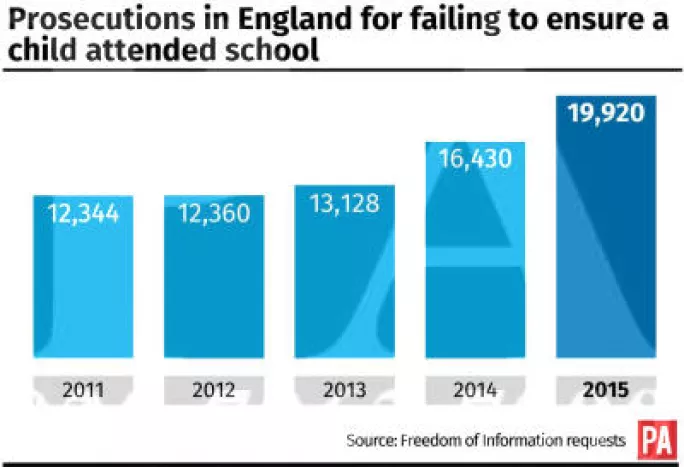A rising number of parents are being prosecuted after their children missed school without permission, with many facing fines, community sentences or prison time.
In 12 months, the number of parents facing court action has increased by more than a fifth, with almost 20,000 people taken to court in 2015 alone, statistics obtained by the Press Association show.
And, between 2013 and 2015, 33 parents were jailed because of their children’s truancy from school.
The number of prosecutions has been steadily rising since a major government crackdown on children missing school in 2013. The changes included tough new rules on term-time holidays.
Ministers have repeatedly argued that every extra school day that children miss can affect their GCSE results, although this claim has been challenged.
The new statistics are being published on the day that the Supreme Court is due to give a ruling in a landmark legal battle between Isle of Wight Council and a father who took his daughter on holiday during term time, without her headteacher’s permission.
Prosecutions on the rise
In total, 19,920 people in England were prosecuted in 2015 for failing to ensure that a child went to school - equivalent to around 105 cases for each day of the school year.
This was up by 21 per cent on 2014, when 16,430 faced prosecution. And there has been a 61 per cent increase since 2011, when 12,344 cases were heard by the courts.
The Ministry of Justice statistics, gathered through freedom of information requests, cover two truancy-related offences under the Education Act 1996.
An analysis of the data shows that of those taken to court in 2015 - the latest year for which figures are available - three out of four (75 per cent), 14,890 people, were found guilty.
Of these, the vast majority (77 per cent) were fined. The average penalty was £176, up from £172 in 2014 and £155 in 2011.
Eight people were jailed in 2015, while 553 were given community sentences.
Trips with ‘genuine educational value’
Justine Roberts, chief executive of parenting website Mumsnet, said: “Mumsnet users are supportive of teachers who want to minimise absences and disruption, but at the moment even trips with genuine educational value risk being refused - and if an older child is truanting without their parents’ knowledge, fines are unlikely to resolve the problem.”
She said that parents would like to see headteachers given more discretion over absences.
Today, the judges are to rule on an appeal by Isle of Wight Council in a case involving father Jon Platt, who took his daughter on a seven-day family trip to Disney World in Florida in April 2015.
The council prosecuted Mr Platt after he refused to pay a £120 penalty.
Local magistrates found there was no case to answer, and the council took its case to the High Court in London, where two judges upheld the decision.
Speaking ahead of the judgment, Mr Platt said that if the Supreme Court ruled in favour of the argument put forward by education bosses, it “means that regularly attending school means attending every day, whenever the school demands it - 100 per cent attendance”.
Costly holidays for parents
Parents have raised concerns about the increased cost of taking family holidays during the school holidays. To coincide with the court ruling, travel company FairFX has analysed the cost of 104 holidays, comparing summer-holiday departures with a term-time departure a few weeks earlier.
It found that, on average, a holiday for a family of four at the start of August was £905 more expensive than a holiday taken four weeks earlier: an increase of 32 per cent. And it was £1,301 - 55 per cent - more expensive than a holiday taken eight weeks earlier, in mid-June.
Want to keep up with the latest education news and opinion? Follow Tes on Twitter and like Tes on Facebook





